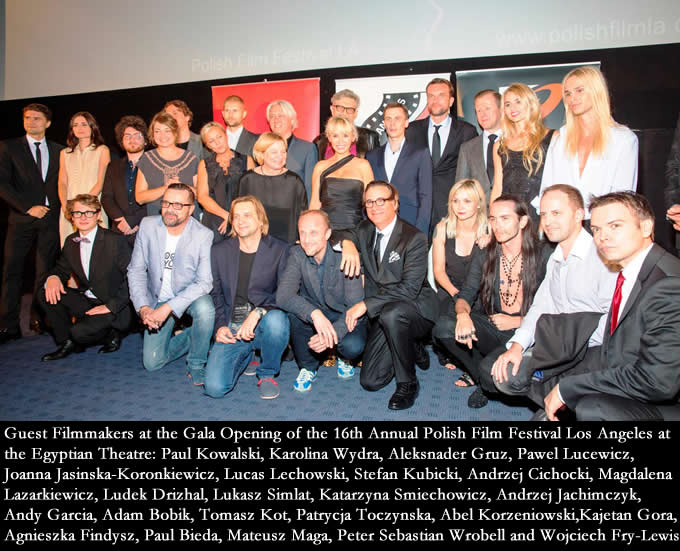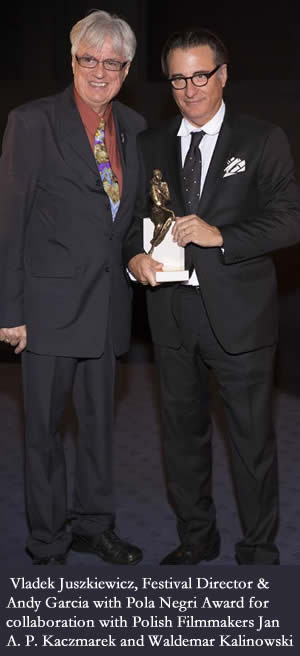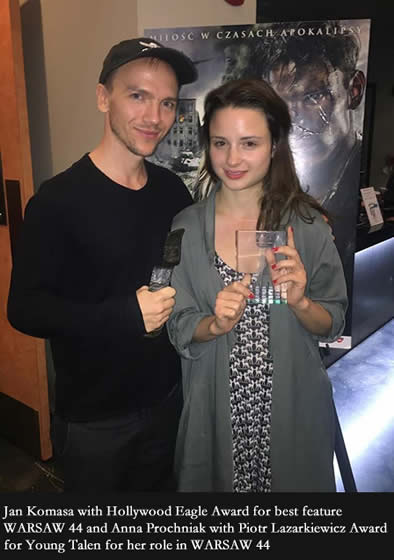 2015 Polish Film Festival, Los Angeles 2015 that was held from October 13 to October 22 was a great success, attracting international film fans to watch the latest and best of Polish cinema.
2015 Polish Film Festival, Los Angeles 2015 that was held from October 13 to October 22 was a great success, attracting international film fans to watch the latest and best of Polish cinema.
To look back at the festival, we had an interview with Polish Film Festival, Los Angeles founder and director, Vladek Juszkiewicz.
Bijan Tehrani: Looking back at the 2015 Los Angeles Polish Film Festival, how happy are you with the outcome?
Vladek Juszkiewicz: I do not think we have reasons to complain. Attendance was pretty good. The program was diversified; everybody could find something to watch and enjoy. Some of the films stirred discussions. Q & A with our guests were popular.
BT: Did you m ake any changes to the venue you have been using or have you decided to stay with the same ones?
ake any changes to the venue you have been using or have you decided to stay with the same ones?
VJ: Placing our Festival in two Laemmle Theatres (NoHo7 & Royal) on two ends of the city was the right decision. We are waiting for the Laemmle Santa Monica to reopen, so maybe we can go back there.
BT: I have been witnessing the growth of the Polish Film Festival Los Angeles every year while other festivals are facing losing the audience and are mostly shrinking. How do you overcome the challenges?
VJ: It is not easy to host a film festival in a city which has 300 of them. First, we do not look at the other festivals as a competition. As much as we can and as much they want to cooperate, we try to collaborate with them. When we put the program together we try to include films that will bring interest to different communities in the city. Advertising is expensive and not easy. We put banners and posters on the street and advertise in Los Angeles Times. We talk on radio stations. We try to be active all year long promoting and informing about other events not necessarily connected with film. We are trying to be active on Facebook.
BT: What I also like about your festival’s approach, is that you involve Hollywood and Hollywood celebrities with Polish Film Festival Los Angeles and I think this may be the only way to give Polish films a good an exposure and a chance to find distribution in US. Please tell us about it.
VJ: We are giving Polish films a platform which they can use to get interest from distribution companies. We cannot to this for the filmmakers. They have to step in and take advantage of what we prepare for them. We created the Pola Negri Award for non-Polish filmmakers for collaboration with Polish filmmakers, for non-Polish filmmakers who make movies with Polish subjects, or for non-Polish actor portraying a Polish character. This year the award was presented to Andy Garcia for his collaboration with Jan A. P Kaczmarek and Waldemar Kalinowski. The award is a sculpture made each year by Polish artist Piotr Michnikowski.
BT: Please tell us about the guests that attended the festival and if they had any interactions with the audiences.
VJ: We like to bring young filmmakers from Poland. Those are artists with great potential and they really appreciate coming here and very often make something from it. Films that have Q & A after screenings have a larger audience. We try to bring actors, directors, and this year composers to meet with the audience. This year we had one actor, Lukasz Simlat, who appears in seven films, Tomasz Kot in three films. Most people stay for the Q & A and conversations continue in the foyer. 
BT: How well are the festival awards received in Poland and by Polish filmmakers?
VJ: For some filmmakers including their film into our program makes them feel like a winner and they express that on social media. Because their work is judged by Hollywood filmmakers, it gives a different perspective to their work. The word “Hollywood” is in the name of our awards so they say, that they get awards in Hollywood. Some of our jurors watch Polish films for the first time and after this experience they want to see more and this is a reward for the filmmakers even when they are not winners.
BT: Which films were the most popular among your audience?
VJ: There were few films which brought a bigger audience. In alphabetical order: Gods by Lukasz Palkowski, A Grain of Truth by Borys Lankosz, Warsaw 44 by Jan Komasa and Warsaw by Night by Natalia Koryncka Gruz.
BT: How do you see the future of the festival?
VJ: I think that we are going in the right direction. We cannot seat and relax. We have to work harder to bring more audience to the theatres, especially young people. We need to acquire greater involvement of the community and more collaboration with other festivals and film schools.

